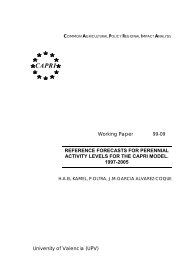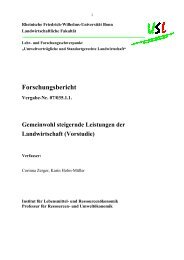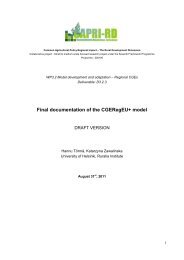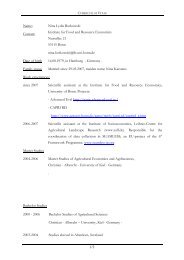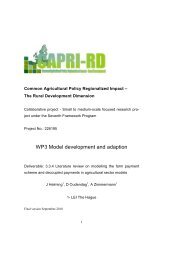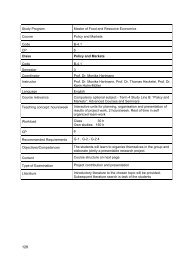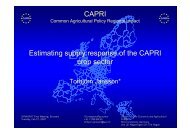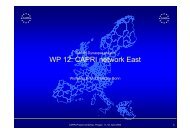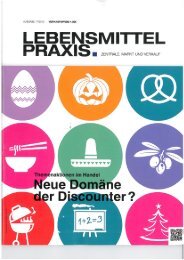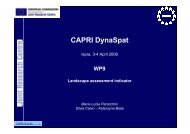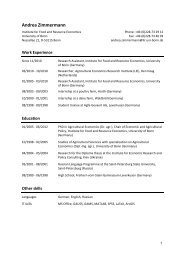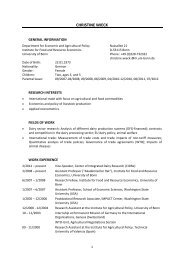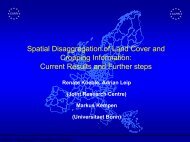Research proposal of sub-project B2 for second phase - Institut für ...
Research proposal of sub-project B2 for second phase - Institut für ...
Research proposal of sub-project B2 for second phase - Institut für ...
You also want an ePaper? Increase the reach of your titles
YUMPU automatically turns print PDFs into web optimized ePapers that Google loves.
FOR1501 – RCR (2)<br />
<strong>B2</strong>: Resilience <strong>of</strong> SES from a Resource Economics Perspective<br />
• There is no single resilience measurement <strong>for</strong> any given SES. Resilience depends on the<br />
scale <strong>of</strong> measurement.<br />
<strong>Institut</strong>ional economics analysis (Kenya): The following results have emerged from the work<br />
done on understanding the challenges that agro-environmental institutions are facing, hence<br />
limiting their capacity to enhance SES resilience:<br />
• Formal institutions are weak, based on the observation, <strong>for</strong> instance, that very few actors<br />
have a legal permit <strong>for</strong> their water abstraction activities.<br />
• The newly created WRUAs are not yet operational: they are top-down institutions lacking<br />
self-organizations <strong>of</strong> users, but their functioning might assist in basin-wide management.<br />
• Volatilities in water levels, siltation, eutrophication and water over-abstraction leading to<br />
scarcity were identified as the key environmental challenges driven by both anthropogenic<br />
influences and natural conditions.<br />
• In principle, interactions among farms at the lake and farmers at the upper catchments<br />
could enhance the robustness <strong>of</strong> this specific SES by making use <strong>of</strong> Payments <strong>for</strong><br />
Environmental Services (PES). A first PES pilot <strong>project</strong> is in place, but the payment<br />
amounts are very small.<br />
<strong>Institut</strong>ional economics analysis (South Africa): Findings from the surveys on living standards<br />
investigations <strong>of</strong> the institutional settings governing resource use in communal production<br />
systems <strong>of</strong> rural Thaba Nchu are outlined, which are followed by a discussion on their<br />
implications <strong>for</strong> resilience.<br />
<strong>Institut</strong>ional collapse: External interventions under Apartheid in the <strong>for</strong>m <strong>of</strong> resettlements to<br />
and within the Bophuthatswana homeland led to an erosion <strong>of</strong> social networks and social<br />
embeddedness. During Apartheid, top-down agricultural management schemes hampered<br />
the accumulation <strong>of</strong> social capital and crowded out the intrinsic motivation <strong>of</strong> stakeholders.<br />
The sudden halt <strong>of</strong> all agricultural services after the fall <strong>of</strong> Apartheid <strong>sub</strong>tracted all external<br />
capital from the system and led to an institutional collapse <strong>of</strong> the SES. Interview results<br />
indicate that decisions making only takes place on an individual level and is based on<br />
heuristics.<br />
Moderate overstocking: AA relative similarity <strong>of</strong> herd sizes was observed, which can be<br />
attributed to high levels <strong>of</strong> normative sanctioning. Structural inertia regarding herd size within<br />
the village is also reflected by low aspiration levels <strong>of</strong> respondents with respect to desired<br />
herd sizes. Overall, the rangeland faces long-term degradation which is, however, not due to<br />
overstocking in terms <strong>of</strong> exceeding recommended animal numbers, but rather a result <strong>of</strong> the<br />
absence <strong>of</strong> joint herd management ef<strong>for</strong>ts (no fencing, no rotational grazing).<br />
Decoupling <strong>of</strong> the livestock SES: Most households depend, to a large extent, on<br />
governmental transfers and remittances from migrant workers. Overall, the limited resource<br />
size in conjunction with age-based governmental transfers, normative sanctioning, and<br />
migration <strong>of</strong> workers fostered a process <strong>of</strong> de-agrarization. This is also a result <strong>of</strong> the<br />
relatively low pr<strong>of</strong>itability <strong>of</strong>, and thus low economic dependence on, livestock production as<br />
a means <strong>for</strong> income generation. Thus, the SES is in an ongoing process <strong>of</strong> decoupling with<br />
respect to the ecological and socio-economic dimensions.<br />
Implication <strong>for</strong> resilience: Resilience cannot be measured on a single scale in isolation.<br />
Instead, linked scales <strong>of</strong> resilience on the household, social, ecological and general system<br />
level must be taken into account. Livelihoods <strong>of</strong> individual households in communal<br />
A. Proposal Data and Obligations / Daten zum Antrag und Verpflichtungen 11



